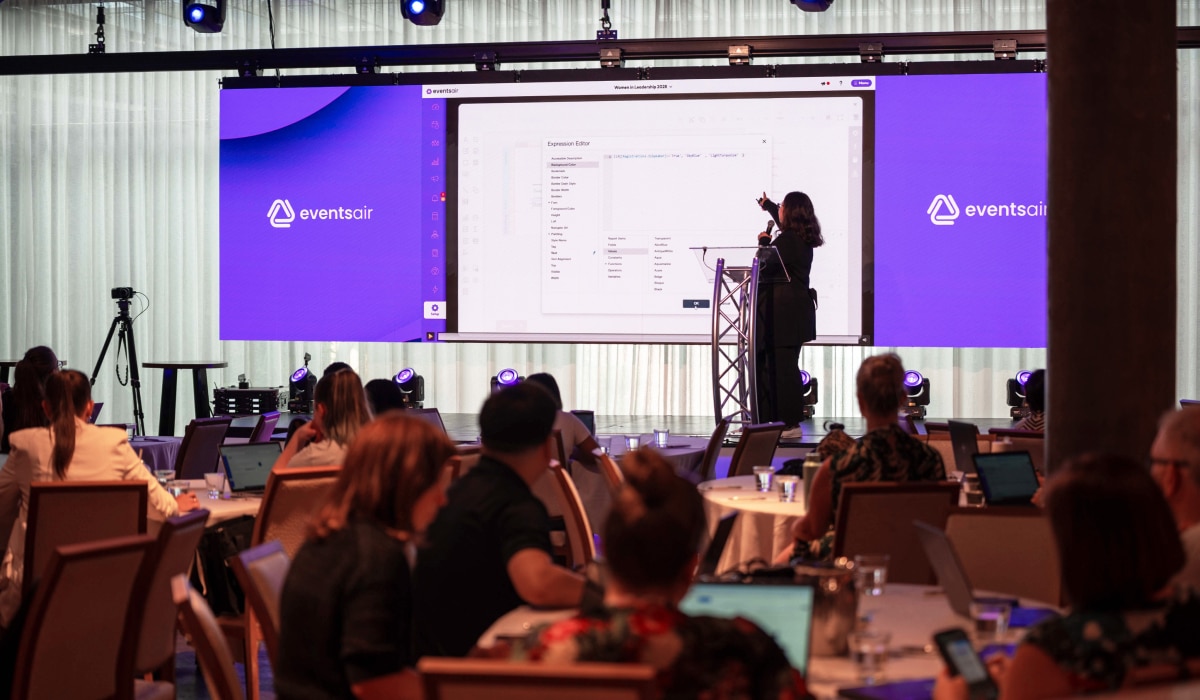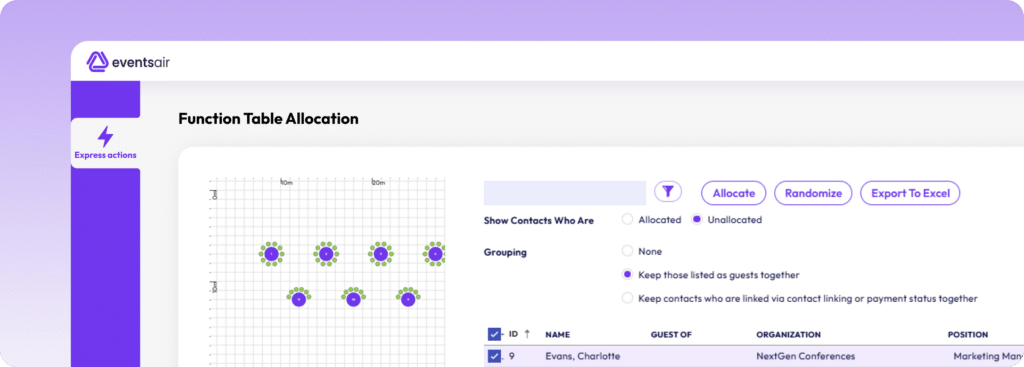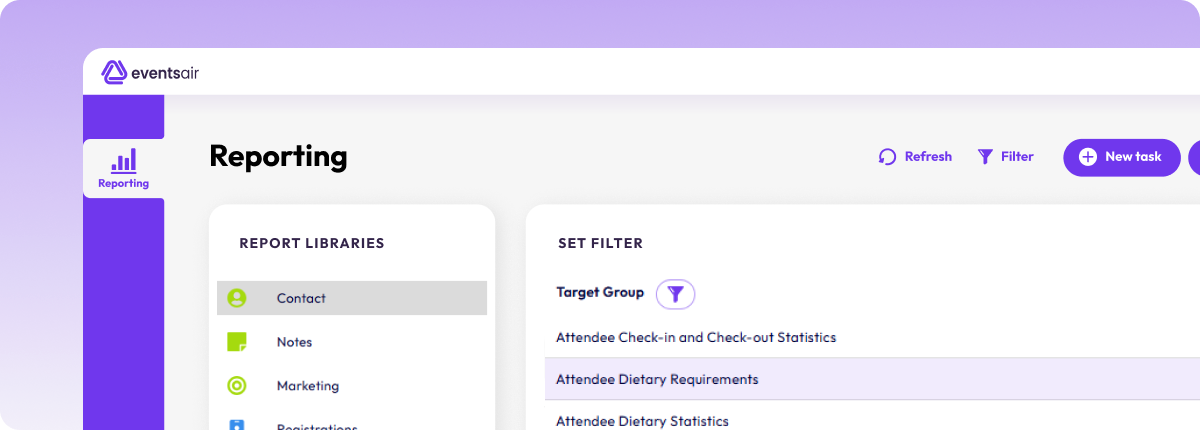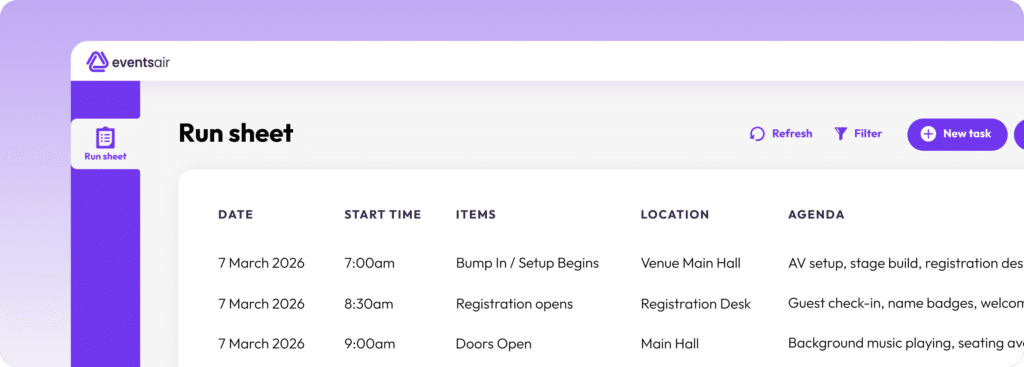How to Find the Perfect Venue for Your Event

Choosing the right venue can make or break an event. Whether you’re planning a corporate conference, a product launch, or a gala dinner, the venue sets the tone for the entire experience. The right space enhances engagement, ensures smooth logistics, and leaves a lasting impression on attendees.
But with so many options available – ranging from traditional ballrooms to unique outdoor locations – how do you find the perfect fit? The process goes beyond just capacity and location; factors like accessibility, ambiance, technology, and flexibility all play a crucial role in shaping the attendee experience.
In this EventsAir guide, we’ll walk you through the essential criteria for selecting a venue that aligns with your event’s goals, budget, and audience expectations. Whether you’re organizing a small networking event or a large-scale international conference, these insights will help you make an informed decision and create a memorable experience for all.
Why is venue selection important?
The venue is more than just a location, it’s the foundation of a successful event. A well-chosen venue can elevate the atmosphere, streamline event logistics, and enhance attendee satisfaction.
Here’s why selecting the right venue is important:
First impressions matter
The venue is one of the first things people notice when they arrive. A stylish, well-organized space creates a great first impression and gets everyone excited for the event. Whether it’s a modern conference center or a fun offsite location, the right spot instantly draws guests in.
Logistics and accessibility
A venue should be easy for everyone to get to, whether they’re coming from nearby or traveling from out of town. Think about transportation options, parking availability, and how close it is to airports or public transit. On top of that, the layout should keep things running smoothly, making it easy to move between sessions, dining, and networking areas.
Impact on engagement
The way a venue is designed and laid out can make a big difference in how engaged attendees feel. Spaces that invite connection – like open networking areas, cozy seating, and bright meeting rooms – help boost participation and make the event experience more enjoyable for everyone.
Support for technology and amenities
Today’s events need reliable tech, whether it’s high-speed Wi-Fi, AV equipment, or live streaming. A venue that’s equipped to handle your needs makes sure your presentations, virtual features, and interactive elements, runs without a hitch.
Budget and value considerations
Choosing a venue that fits your budget and offers great amenities is super important. Some venues even include catering, security, and staffing in their packages, which can save you some money. Knowing exactly what’s included in your venue contract can help you avoid any surprise costs later on.
How to find a venue for an event
Selecting the right venue takes some thought and careful planning. From figuring out the right capacity and accessibility to handling contracts and vendor needs, there are various factors to consider. But getting the perfect space for your event is possible, especially if you use the following strategies.
1. Define your event goals and needs
Before searching for a venue, outline your event’s core objectives. The space must align with attendee expectations, logistical needs, and branding. Without clear requirements, you risk overpaying for unnecessary features or choosing an inadequate space.
Some key factors you should consider are:
- Event type & format: Is it a conference, trade show, gala, or hybrid event? Different formats will call for different venue styles.
- Capacity & layout: Think about how many people will attend and make sure the venue has enough space for seating, networking, and exhibitors.
- Technical & AV requirements: Double-check that the venue can handle live streaming, good lighting, sound, and reliable WiFi. Tip: Sometimes internal AV is incredibly costly, so make sure you ask if you can bring in an AV partner – especially useful if you have worked with them before.
- Accessibility & location: Pick a spot that’s easy to get to, close to major transport hubs, and fully ADA-compliant.
Fortunately, EventsAir has your back when it comes to event planning. With our solution you can easily map out event layouts, organize seating plans, and keep track of attendee logistics, making sure everything runs smoothly and fits perfectly with your venue and event needs.

2. Set a realistic budget
Decide how much you’re comfortable spending and make sure to include all venue-related costs, like rental fees, security, cleaning, and extras like catering, Wi-Fi, or audiovisual equipment.
Don’t forget to watch out for hidden costs, such as overtime charges or setup and breakdown fees, they can add up fast. Setting your budget early will help you focus on what matters most, make smart choices, and avoid any surprise expenses that could throw off your plans.
Tip: If your audience are likely to run their own events at this venue in the feature (think marketing professionals), then consider offering an exclusive venue partnership to your chosen location. This can keep your budgets in check and provide a win-win agreement for everyone.
3. Research & shortlist potential venues
Once you know exactly what your event needs, it’s time to start checking out and comparing venues. Taking your time here is key as rushing can lead to surprises like hidden costs, accessibility problems, or missing must-have amenities. Creating a clear venue shortlist will help you effectively find the best fit for your event.
Here’s how you can research and shortlist venues:
- Explore venue directories & industry networks: Check out platforms like CVB websites, venue marketplaces, and industry associations for reliable venue options.
- Check availability & pricing: Reach out early for quotes to compare prices, package details, and date flexibility. Tip: We all know some days attract cheaper pricing, so getting quotes for multiple days throughout the week should be prioritised so you can compare just how much that difference is.
- Know the vendor & catering rules: Some venues stick to their own vendors, while others let you bring in your favorite catering, AV, or décor services.
- Look into venue reputation: Read reviews, ask for references, and visit in person to make sure the service and reliability meet your expectations.
4. Visit and evaluate shortlisted venues
A venue might look perfect on paper, but it’s better to verify in person so you can ensure a seamless event. Plan a visit to check out the spaces in person. Take note of the layout, ambiance, cleanliness, and amenities. Also, make sure to speak with the venue staff about their experience hosting similar events and see how flexible they are with any special requests you might have.
Here are some more specific aspects to verify:
- Event layout: Make sure the venue makes it easy for guests to move between registration, sessions, networking spots, and exhibits without any hassle.
- Technology and AV setup: Test the WiFi, sound systems, lighting, and live-streaming options to keep everything running smoothly during presentations.
- Access and transportation: Look into parking, public transit options, and ADA accessibility to ensure everyone can get there without any issues.
- Catering and service restrictions: Double-check food and drink policies, along with any vendor rules, to avoid unexpected surprises.
- Emergency exits and safety measures: Make sure the venue has clear evacuation routes, good security measures, and access to medical support, just in case.
5. Check availability and negotiate terms
Venue contracts can include hidden fees, restrictive policies, and non-refundable clauses, making negotiation essential.
Check if the venue is available on your chosen date and go over the contract details, like cancellation policies, setup times, and any extra costs. Having a friendly conversation with the venue can often help you get better pricing and more flexible terms.
Booking the venue early helps avoid scheduling conflicts and unexpected price increases, giving you more time to focus on planning a great event. Smart negotiations can keep your budget on track and minimize risks, making the whole process smoother and less stressful.
6. Finalize the venue and sign the contract
Once the venue is locked in, it’s time to sort out the logistics to keep everything running smoothly. This means coordinating with vendors, confirming layouts, and testing technical systems to avoid any last-minute hiccups.
With EventsAir, you can easily manage floor plans, track vendor timelines, and even provide real-time reports on dietary requirements – all in one place. It’s a simple way to keep everything on track and stress-free.

Good logistical planning helps avoid delays, clears up any confusion, and ensures a seamless experience for everyone, attendees, speakers, and staff alike.
Best practices for choosing the right venue for your event
Prioritize flexibility
Venues that offer customizable spaces provide the flexibility to design the layout and ambiance to perfectly fit your event’s unique needs. Whether you’re hosting a corporate gathering or a creative workshop, having the ability to adjust the setup can make all the difference.
Look for venues that feature modular seating arrangements, multiple breakout rooms for smaller group activities, or adaptable floor plans that can transform to suit various purposes. This level of versatility ensures your event runs smoothly and delivers a memorable experience for all attendees.
Ensure strong vendor support
Some venues have exclusive vendor partnerships, meaning you’ll be required to use their selected caterers, AV teams, and decorators. Others are more flexible, allowing you to bring in your own suppliers to customize your event to your preferences.
It’s important to verify whether the venue allows you to work with your preferred vendors or if you must rely solely on their in-house services. This can greatly impact the overall feel, quality, and even budget of your event, so thoroughly checking these details in advance is key to ensuring everything aligns with your vision.
Assess venue staff & support services
Even the best venues can create challenges if the on-site staff lacks experience. Before finalizing a contract, assess the venue’s event support team, technical crew, and vendor coordination process.
For example:
- What is the response time for tech issues? A slow AV team can cause disruptions during live sessions.
- Do they offer dedicated venue managers? A single point of contact streamlines communication and troubleshooting.
- How do they handle last-minute changes? Flexible support ensures smooth schedule shifts or unexpected requirements.
Using EventsAir, planners can digitally coordinate with venue teams, store emergency contacts, and document service-level agreements, ensuring clear communication and accountability.

A strong venue support team enhances event execution, reducing stress and operational delays.
Test the technology
Before finalizing a venue, make sure to thoroughly test the Wi-Fi speed, audio-visual (AV) equipment, and power supply to ensure everything meets your event’s needs. Slow internet or faulty AV systems can quickly derail even the most well-planned gatherings. It’s also a good idea to conduct a full tech rehearsal ahead of time.
This allows you to troubleshoot any potential issues, such as poor connectivity, malfunctioning microphones, or insufficient power outlets, and helps avoid last-minute technical failures that could disrupt your event and leave attendees frustrated.
Consider the guest experience
Think about every aspect of your attendees’ journey – from the moment they arrive to the time they leave. Consider how they will navigate the event space and ensure there is clear and visible signage to guide them. Provide comfortable seating that accommodates different needs and preferences, and design easy-to-navigate spaces that minimize confusion or congestion.
Pay attention to details like lighting, accessibility, and even the availability of amenities such as charging stations or refreshments to create a seamless and enjoyable experience from start to finish.
Take advantage of technology
Embracing event management solutions can streamline operations and enhance attendee experience. Platforms like EventsAir help event organizers manage registration, attendee tracking, and real-time communications, ensuring a seamless experience for both in-person and virtual participants. Integrated event apps, digital check-ins, and live polling can further improve engagement while reducing logistical headaches.
Plan for scalability
Attendance numbers rarely stay fixed as unexpected RSVPs, last-minute sponsor additions, or fluctuating hybrid engagement can make planning challenging. That’s why it’s crucial to choose a venue that can scale up or down seamlessly, accommodating changes in capacity without compromising comfort or functionality.
Here are some ways you can plan for scalability:
- Choose venues with adjustable spaces: Movable walls or multi-purpose rooms allow quick capacity changes.
- Confirm overflow options: Ask about additional breakout spaces or satellite rooms for unexpected high turnout.
- Ensure hybrid adaptability: If virtual engagement increases, secure extra bandwidth, streaming support, and remote attendee accommodations.
Manage your event venue effectively using EventsAir
Finding the right venue is about more than just location and cost, it’s about ensuring seamless logistics, a great attendee experience, and operational efficiency. By negotiating smart contracts, verifying infrastructure, and optimizing venue flow, organizers can avoid pitfalls and create a high-impact event.
With EventsAir, planners can manage venue selection, optimize layouts, coordinate vendors, and track real-time logistics—ensuring every detail aligns with event goals. Our tools make it easy to streamline venue management for in-person, hybrid, and virtual events.
Ready to simplify your venue selection process? Book a demo with EventsAir today!



